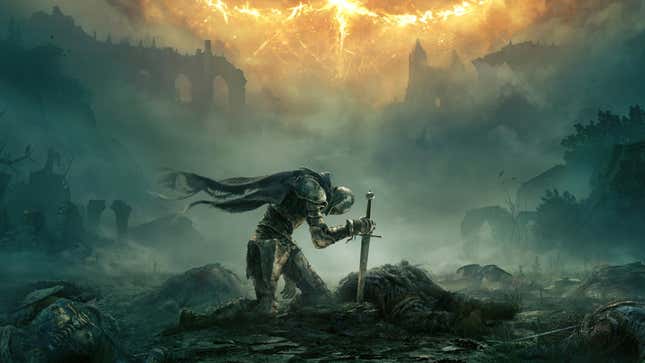
It was announced earlier today that Elden Ring, FromSoftware’s 2022 Game Of The Year For Loads Of People (including most staff at this website), has sold 20 million copies worldwide since its release a year ago. That is a lot.
You may be wondering, why am I pointing this out on Kotaku, a website that in 2023 generally couldn’t give half a shit about sales boasts/figures, especially when they come packaged in a press release from the publisher?
It’s because I think Elden Ring, a tough-as-nails action/RPG that’s basically a singleplayer experience, is making one hell of a point going out and selling 20 million copies in 2022-23. It’s showing publishers, and the people who control their purse strings, that not every video game released in the modern age has to be a Forever Game, a live service timesink that not only demands our constant attention, but is constantly asking for money while it’s doing it.
You buy Elden Ring, you play Elden Ring, you rinse Elden Ring and then you’re done with it! There are no DLC packs, no season passes, no multiplayer modes selling skins for $2. What you paid for is what you got. For many people raised on less exploitative games, or tired of modern gaming’s demands (or both!), Elden Ring was, conceptually, a near-perfect video game experience.
I know it’s far from alone. It’s not like every game ever released these days is a live service drain. Indeed that GOTY list I linked to above is dominated by standalone, singleplayer experiences.
Impressive Elden Ring sales numbers
But none of them have sold 20 million copies. That’s what makes Elden Ring’s sales so important. They don’t just show a traditional video game can do well, they show it can be an absolute blockbuster. While nailing down specific sales figures in these days of digital shopfronts can be hard, 20 million puts the game in the same ballpark as Modern Warfare 2 and EA’s FIFA series, an extraordinary achievement for a game that’s hard as hell and enjoyed a fraction of the promotional budget those juggernauts—both full-priced retail games which then try and fleece players for even more money down the road—received.
Know what else is in that sales ballpark? Cyberpunk 2077—which, OK, had its problems and also an astronomical marketing budget—sold over 20 million copies. God of War Ragnarok, another very singleplayer experience released in 2022, has sold over 10 million copies itself (to Sony’s credit much of their first-party strategy, from Horizon to The Last Of Us, walks a similar path). Star Wars Jedi: Fallen Order, the first singleplayer Star Wars game in a very long time? Oh hey, it also sold over 10 million, doing more than well enough to justify a big-budget sequel that’s out very soon.
These huge sales figures aren’t just success stories for the companies involved, but also a sign to other publishers that maybe the people buying and playing games are getting tired of this obsession with fleecing us at every turn, and of stripping the heart out of games in a desperate attempt to prologue our time spent with them. I get that companies know a live service game can potentially make more money than a regular one—look at FIFA, which has made billions off digital card sales on top of its retail profits—but it’s not guaranteed. Not every game has to do this. We don’t have the time or money for it.
Sometimes people just want to play a video game, finish it, enjoy it for what it was and then get on with their lives. And those people are showing there are enough of them out there to not just buy a few million copies of those games, but turn them into absolute blockbusters.





